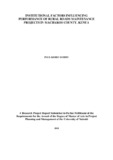| dc.description.abstract | One of the primary challenges confronting Kenya today is the performance of government projects. Legitimate project administration has been fundamental for fruitful project conveyance. Worldwide, interest for qualified project managers has been developing. However, there are not an extensive number of project administrators who have the applicable abilities nor does the important project administration rehearse for attractive project conveyance. The purpose of this study is to establish the institutional factors influencing performance of rural roads maintenance projects in Machakos County, Kenya. The study was guided by the following objectives; to establish the influence of project team competence, funding adequacy, management support and monitoring and evaluation on performance of rural roads maintenance projects in Machakos County, Kenya. The study was grounded on system theory, stakeholder theory, co-evolutionary theory and the eco systemic theory. The study adopted a descriptive research design. The target population for this study composed contractors, road users, Machakos County Government Transport & Roads department officials, KeRRA, KURA and KeNHA officials. A sample population of 216 respondents was arrived at by calculating the target population of 495 with a 95% confidence level. The study selected the respondents using stratified proportionate random sampling technique. Primary data was obtained using self-administered questionnaires. The questionnaire was made up of both open ended and closed ended questions. The researcher personally administered the research instruments to the respondents. After data cleaning which entailed checking for errors in entry, descriptive statistics such as frequencies, percentages, mean score and standard deviation was estimated for all the quantitative variables and information presented inform of tables. The qualitative data from the open-ended questions was analyzed using conceptual content analysis and presented in prose. Inferential data analysis was done using multiple regression analysis. In testing the significance of the model, the coefficient of determination (R2) was used to measure the extent to which the variation in performance of rural roads maintenance projects is explained by the variations of the institutional factors. The study found that project team competence, monitoring and evaluation, funding adequacy and management support influence performance of rural roads maintenance projects in Machakos County greatly. The study concluded that project team competence had the greatest influence on performance of rural road maintenance projects in Machakos County, Kenya followed by monitoring and evaluation, then funding adequacy while management support had the least influence on the performance of rural roads maintenance projects in Machakos County in Kenya. The study recommended that management should allocate adequate financial resources, promote timely disbursement and enhance procurement to ensure all resources required for project implementation are provided in time. | en_US |

